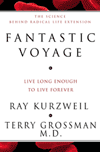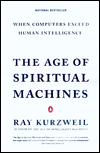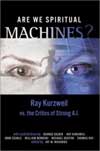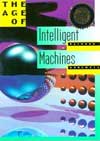| |
||||||
| |
|
|
|
|||
| |
||||||

|
||||||

|
||||||
|
||||||
| |
||||||
| |
||||||
 |
||||||
| |
|
|
|
||||
| |
|
|
|
||||
| |
|
||||||
| |
|
||||||
RAY KURZWEIL is an inventor, entrepreneur, author, and futurist. Called “the restless genius” by the Wall Street Journal and “the ultimate thinking machine” by Forbes, Kurzweil’s ideas on the future have been touted by his many fans, ranging from Bill Gates to Bill Clinton. MIT’s Marvin Minsky writes that “with his brilliant descriptions of the coming connections of computers with immortality, Kurzweil clearly takes his place as a leading futurist of our time.” George Gilder writes that “Kurzweil’s ideas make all other roads to the computer future look like goat paths in Patagonia.” Sun Microsystems Chief Scientist Bill Joy, whose own discussions of the promise and peril of technology have attracted worldwide attention, writes in his now famous Wired magazine cover story that “I can date the onset of my unease to the day I met Ray Kurzweil, the deservedly famous inventor of the first reading machine for the blind and many other amazing things.” Stevie Wonder writes “Ray’s technology and ideas have truly been among the sunshines of my life. Kurzweil’s writings are a wonderful riff on the next century from a keen seer, a great inventor, and a good friend.” Kurzweil’s most recent national best-selling book, The Age of Spiritual Machines (Viking), has received widespread acclaim. It has achieved the #1 status on Amazon in the categories of both science and artificial intelligence and has been published in nine languages. The New York Times writes, “Kurzweil’s latest book ranges widely over such juicy topics as entropy, chaos, the big bang, quantum theory, DNA computers, quantum computers, Godel’s theorem, neural nets, genetic algorithms, nanoengineering, the Turing test, brain scanning, the slowness of neurons, chess playing programs, the Internet—the whole world of information technology past, present, and future. Kurzweil’s writings are for anyone who wonders where human technology is going next.” Wired magazine writes, “Ray Kurzweil has a knack for spotting the next new thing. He has been charging into the future for nearly 40 years. He’s best known for guerrilla assaults on conventional wisdom.” John Casti of Nature describes Kurzweil’s latest book as a “mind expanding account of the rise of intelligent machines. . . .nothing less than a blueprint for how to shove Homo sapiens off centre-stage in evolution’s endless play. . . .If you buy into Kurzweil’s Law of Accelerating Returns—and all empirical evidence currently available supports it completely—then the replacement of humans by machines as the primary intellectual force on Earth is indeed imminent.” Ray Kurzweil is widely regarded as one of the leading inventors of our time. TIME Magazine writes, “Kurzweil’s eclectic career and propensity of combining science with practical—often humanitarian—applications have inspired comparisons with Thomas Edison.” Kurzweil was the principal developer of the first omni-font optical character recognition (OCR), the first print-to-speech reading machine for the blind, the first CCD flat-bed scanner, the first text-to-speech synthesizer, the first music synthesizer capable of recreating the grand piano and other orchestral instruments, and the first commercially marketed, large-vocabulary speech recognition. These technologies continue today as market leaders in their respective industries, industries that Ray Kurzweil pioneered. Kurzweil has successfully founded and developed nine companies in OCR, music synthesis, speech recognition, reading technology, virtual reality, financial investment, medical simulation, and cybernetic art. Kurzweil’s web site, KurzweilAI.net, is a leading resource on artificial intelligence, with more than 1,000,000 readers. Ray Kurzweil received the $500,000 Lemelson-MIT Prize, the nation’s largest award in invention and innovation, and was inducted in 2002 into the National Inventor Hall of Fame. He also received the 1999 National Medal of Technology, the nation’s highest honor in technology, from President Clinton in a White House ceremony. He has also received scores of other national and international awards, including the 1994 Dickson Prize (Carnegie Mellon University’s top science prize), Engineer of the Year from Design News, Inventor of the Year from MIT, and the Grace Murray Hopper Award from the Association for Computing Machinery. He has received twelve honorary Doctorates and honors from three U.S. presidents. He has received seven national and international film awards. Kurzweil is a widely sought speaker and has given keynote presentations at many leading venues, including the Microsoft CEO Summit, the World Economic Forum, Pop!Tech, PC Expo, Business Week, The Council on Foreign Relations, SIGGRAPH, Cowen, TED, ICASSP, the American Psychiatric Association, Agenda, and many others. His presentations to diverse audiences combine wit and keen insight into contemporary issues of technology and its impact on society. His lectures often include appearances by “Ramona,” his “virtual female alter ego,” and other engaging demonstrations of cutting-edge technologies that Kurzweil and his teams have developed. Kurzweil has written five books and hundreds of articles. In recent years, there have been hundreds of articles each year by or about Ray Kurzweil in leading publications, including most major national magazines. His first book, The Age of Intelligent Machines (MIT Press), was named Best Computer Science Book of 1990. This book, written in the late 1980s, has been acclaimed for its remarkably accurate predictions about the 1990s and early 2000 years. His new book Fantastic Voyage: Live Long Enough to Live Forever (Rodale Books), coauthored with Terry Grossman, M.D., describes the science behind radical life extension. His latest book, The Singularity is Near, When Humans Transcend Biology (Viking Sept 2005), expands upon the ever accelerating rate of technological change and examines the union of human and machine. |
|
|||||||




